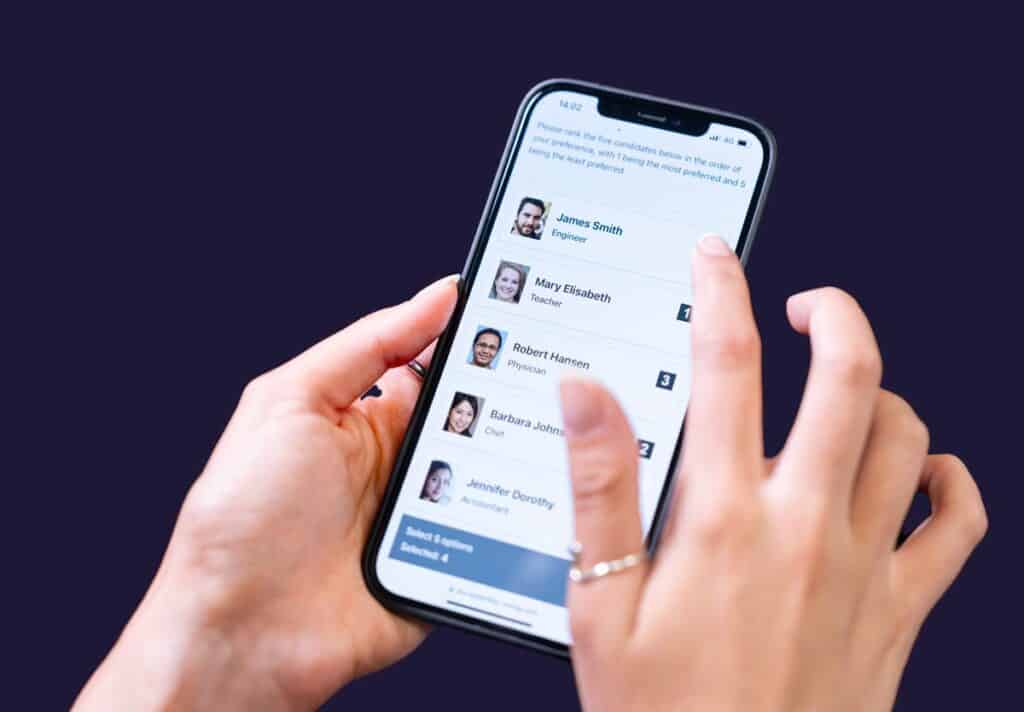VoteHub: The Next Generation Mobile Voting For U.S. Public Elections
VoteHub: The Next Generation Mobile Voting For U.S. Public Elections
Assembly Voting is part of a ground-breaking effort launched by Tusk Philanthropies to develop an end-to-end verifiable mobile voting solution for elections in the U.S. to make it easier and more accessible to vote.
Assembly Voting was awarded a grant to help build an accessible digital absentee voting platform that meets the highest standards for security, verifiability, transparency, and usability.
The goal is to address and solve security and verifiability challenges that have posed a barrier to wide scale adoption of mobile voting.
Assembly Voting is part of a ground-breaking effort launched by Tusk Philanthropies to develop an end-to-end verifiable mobile voting solution for elections in the U.S. to make it easier and more accessible to vote.
Assembly Voting was awarded a grant to help build an accessible digital absentee voting platform that meets the highest standards for security, verifiability, transparency, and usability.
The goal is to address and solve security and verifiability challenges that have posed a barrier to wide scale adoption of mobile voting.
Our Role In The Mobile Voting Project

Together with our partners, we are building an end-to-end verifiable mobile voting solution that will be designed as a digital version of paper absentee voting and comply with all existing absentee voting requirements.
Unlike other mobile voting solutions, the new platform will be based on a zero-trust model that provides a transparent way to address relevant security challenges. The underlying technology will be open-source so security experts and other developers can scrutinize the code and mitigate threats.
The mobile voting solution builds on core technologies in our existing solutions and we are contributing with more than 20 years of experience in developing and operating election systems including areas such as threshold cryptography, election chain, and mixing technologies.
Our Role In The Mobile Voting Project
Together with our partners, we are building an end-to-end verifiable mobile voting solution that will be designed as a digital version of paper absentee voting and comply with all existing absentee voting requirements.
Unlike other mobile voting solutions, the new platform will be based on a zero-trust model that provides a transparent way to address relevant security challenges. The underlying technology will be open-source so security experts and other developers can scrutinize the code and mitigate threats.
The mobile voting solution builds on core technologies in our existing solutions and we are contributing with more than 20 years of experience in developing and operating election systems including areas such as threshold cryptography, election chain, and mixing technologies.

The Tech Components We Are Developing
End-to-end Verifiable Voting Engine
Contains open source client libraries and APIs connecting it to the accessible voting application being developed by the Open Source Election Technology (OSET) Institute. Includes verification tools voters can use to confirm their ballot is recorded as cast and received as counted.
Trustee App
Used to distribute the trust of the system across multiple stakeholders so that the digital ballot box is never controlled by one individual or one institution. At the start of an election the digital ballot box is ‘sealed’ and a digital key is then split between multiple officials who must come together with their parts of the key to unlock it.
Election Administration Application
Election Admin system for election office admins, used for election configuration, distribution of trust between trustees and download of affidavits, signatures and decrypted ballots for printing.
Who Is Part Of The Project?
Tusk Philanthropies launched a campaign for Mobile Voting in late 2017 to bring mobile voting options to U.S. elections and increase voter turnout by making voting more convenient and accessible.
Since 2018, the campaign has completed 20 mobile voting pilots across seven states – Colorado, Oregon, South Carolina, Utah, Virginia, Washington, and West Virginia – for a mixture of voters including UOCAVA and voters with disabilities.
Through these pilots, Tusk Philanthropies discovered the need for a coordinated effort to develop enabling technology for mobile voting using established federal guidelines and national security best practices.
Tusk Philanthropies
Tusk Philanthropies was created by Bradley Tusk, Founder and CEO of Tusk Holdings, to dramatically increase voter turnout and participation in U.S. elections through mobile voting, beginning with UOCAVA voters and voters with disabilities.
Mobile voting is a non-partisan initiative designed to not favor any one candidate or party, but to expand voting options to increase participation in our electoral process.
None of the Tusk entities have a financial interest in any voting technology company they have worked with.

Assembly Voting
Assembly Voting was the first provider of digital elections in Denmark. Since 2001, the company has conducted +6,000 elections with over 35 mio. voters. Today, Assembly Voting provides the majority of digital elections in Scandinavia to professional associations, municipalities, energy and pension companies and unions.
Assembly Voting is based on the idea of strengthening democratic participation, through the integration of democratic processes and new technology.
The core focus is on creating systems where the entire voting process can be proved using advanced end-to-end encryption technologies and documented processes.

Full Transparency While We Build The System

From the very beginning of The Mobile Voting Project, transparency and proactively seeking feedback from the broadest possible range of election stakeholders on the design and architecture, has been a guiding principle in the development of the mobile voting application that we are working on together with our U.S. partners.
As part of this effort, we are continuously releasing project documentation such as preliminary architectural narratives, designs, threat model summaries, and more. These documents are meant to serve as a guide for interested parties to assess the current state of the build, understand broad dataflows and cyber implications, and provide input or ask questions.
All of the current design artifacts are publicly accessible from the Mobile Voting Project website, and we invite you to explore each document and see the progress made so far during the development of this system
Full Transparency While We Build The System
From the very beginning of The Mobile Voting Project, transparency and proactively seeking feedback from the broadest possible range of election stakeholders on the design and architecture, has been a guiding principle in the development of the mobile voting application that we are working on together with our U.S. partners.
As part of this effort, we are continuously releasing project documentation such as preliminary architectural narratives, designs, threat model summaries, and more. These documents are meant to serve as a guide for interested parties to assess the current state of the build, understand broad dataflows and cyber implications, and provide input or ask questions.
All of the current design artifacts are publicly accessible from the Mobile Voting Project website, and we invite you to explore each document and see the progress made so far during the development of this system
